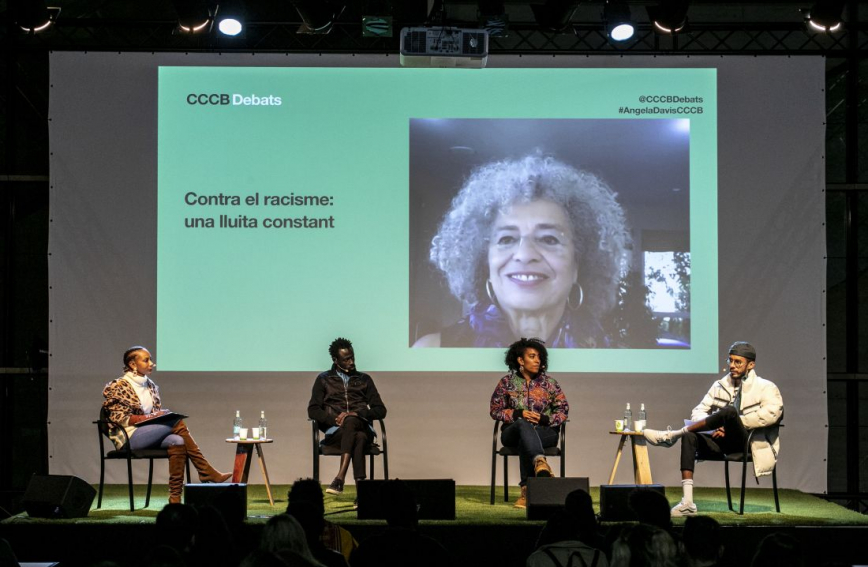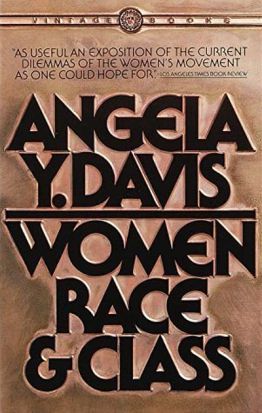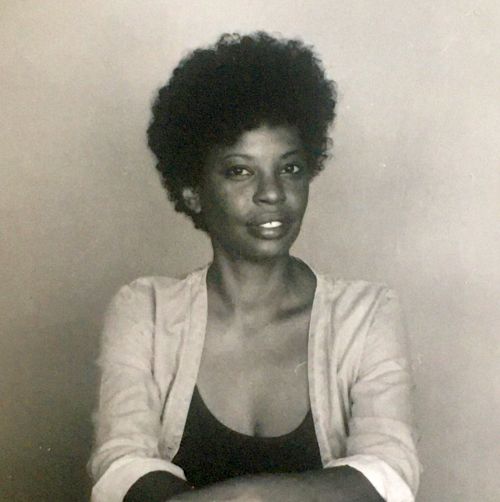Angela Davis. A history of civil disobedience
- In transit
- Dec 20
- 11 mins

Angela Davis embodies the revolutionary fascination and the nostalgia for remote struggles. She has an innate ability to translate complex thoughts into slogans for the public at large and a magnetism that, far from waning over the years, has catapulted her into the limbo of revolutionaries, a place where there are hardly any women.
This year, at the height of the pandemic in the United States and in the midst of protests over the murder of African-American George Floyd, the Juneteenth – an unofficial celebration of the end of slavery in the United States – took on the appearance of resistance. In the Californian city of Oakland, it was commemorated with marches in solidarity with the Black Lives Matter movement and its fight against racial violence. The day is encapsulated in a snapshot loaded with revolutionary symbolism: Angela Yvonne Davis, standing in the back of a semi-convertible, with her fist raised, a gesture known as the Black Power salute as a sign of solidarity and support for the demands. The image swept across the world like wildfire.
Angela Davis embodies the revolutionary fascination and the nostalgia for remote struggles. She has an innate ability to translate complex thoughts into slogans for the general public and a magnetism that, far from waning over the years, has catapulted her into the limbo of revolutionaries, a place where there are hardly any women. When the world thinks of her, it still sees the insurgent woman with afro hair, involved in the Black Panther Party and forever ready to lead the masses into the struggle. But her charismatic path goes beyond subversive symbolism and is part of the time-honoured American tradition of civil disobedience.
Today she is a professor emerita at the University of California (Santa Cruz) and one of the most influential activists and intellectuals in the United States. And although her activity has always centred on the progressive and politicised black community, as a Marxist thinker she believes that the black struggle must be linked to the working-class struggle, ever accompanied by cooperation and political solidarity between peoples and nations. For this reason, she embraces multiple causes, from the anti-racist struggle, feminisms and the abolition of the industrial-prison system to LGTBIQ struggles and the fight for the freedom of the Palestinian people.
Between iconography and myth
This year Time magazine recognised her as one of the 100 most influential people of 2020 on account of her social activism. And although she abandoned her natural hair years ago, The New York Times considers Angela Davis’ afro hairstyle one of the biggest influences on 20th-century trends. Unsurprisingly, on her release from prison, at just 30 years old, the writer and literary editor of Random House, Toni Morrison, commissioned her autobiography, Angela Davis: An Autobiography (1974).
Over the years, she has earned intergenerational and interracial respect in academia, on the streets and in the media. Davis has been featured in the revolutionary motifs on walls, t-shirts and posters for more than half a century, a space that she shares with figures such as Mandela, Luther King and Gandhi. Although her radicalism has been absorbed by a system whose abolition she herself demands, neither her discourse nor, least of all, the symbolism of her afro, have lost a shred of appeal. Indeed, this double game of criticism and acceptance of the rules of the game has made her the object of reproach in the most radical sectors, which have long accused her of being a reformist and neo-capitalist paid by the system and wholly subject to the interests of the bourgeoisie and the white majority. Not even has this criticism been able to topple her, because few can move across political, activist and aesthetic frontiers as jubilantly as Miss Davis.
Although her iconographic representations have multiple contradictions and implications, most of them bother her. But she does not reject them, and she reflects on the meaning and power of images in a contemporaneity in which visual imaginaries hang over social narratives. In her text “Afro Images: Politics, Fashion and Nostalgia” (1994), she analyses the visual stereotypes that her afro generates through the image theory legacies of John Berger and Susan Sontag. In it, she observes how her figure, in addition to being set in revolutionary fiction, is already integrated into African-American historical images. Moreover, she warns that reducing historic politics to a contemporary popular culture fad can make collective visual memory ahistorical and apolitical.
On hearing Malcolm X's speech, Davis began to take notice of daily repressions and of how her preferences came from the fact that she felt inferior to the white population.
Training and points of reference
Angela was born during the zenith of the Jim Crow segregation laws, in one of the societies most plagued by racial violence in the South, that is, Birmingham (Alabama). Although she was raised in a family that was a member of the NAACP (National Association for the Advancement of Colored People) and the Southern Negro Youth Congress, her political awakening did not come about until she heard Malcolm X’s speech at Brandeis University (Massachusetts) in the early 1960s. From that point on, she began to take notice of daily repressions and of how her musical preferences or the leaving behind of speech patterns came from the fact that she felt inferior to the white population.
She received one of the best possible educations for a black person in the United States. During her studies at Brandeis, she spent a year at La Sorbonne in Paris. Following her graduation, she headed to Germany, to the Faculty of Philosophy at the University of Frankfurt. With Adorno and Marcuse as professors, in her doctoral dissertation she discussed Immanuel Kant’s analysis of violence in the French Revolution. These European experiences broadened her reference points by immersing her in the reading of French writers and poets such as Baudelaire, Rimbaud and Proust, and Sartre’s French existentialism. At the same time, she was introduced to Marxist philosophy and ideology, and to the duty of the individual to rebel against the system.
 A moment in the conversation at the CCCB last October in which Angela Davis took part via videoconference. From left to right: Isabelle Mamadou, Marra Junior, Basha Changuerra and Jeffrey Abé Pans. © Edu Bayer
A moment in the conversation at the CCCB last October in which Angela Davis took part via videoconference. From left to right: Isabelle Mamadou, Marra Junior, Basha Changuerra and Jeffrey Abé Pans. © Edu BayerHer ideological underpinnings, however, lie in black and Marxist thinkers, those who represent what Robin D.G. Kelley called the “Black Radical Tradition” (1944), who explore the relationship between capital and racism, addressing the role of slavery and colonialism in the consolidation of capitalism. Marcus Garvey, Frantz Fanon, Cedric Robinson, James Baldwin and W.E.B. Du Bois are among those who afforded her new ways of understanding a reality in which “white” represents the norm and universality.
Back in the United States, she became a member of the Communist Party and joined the fight for civil rights, the feminist movement and the campaign against the Vietnam War. This period in her life marked the course of an atypical and rebellious existence, perhaps sidelined by those who subscribed to normativity and could not comprehend how she could abandon a safe path towards the middle-class American dream in order to adhere to revolutionary activism. In a sense, these subjective appraisals did not affect her, and when she looks back she feels proud to have been a part of the historic time when collective black consciousness was crystallising. She does so with hardly any romanticism because she acknowledges the mistakes of the revolution and warns of the dangers of a nostalgic relationship with the Black Panthers.
Industrial-prison system
In the early 1970s, Angela Davis had very strained relations with the authorities; she was expelled from university and falsely accused of kidnapping, conspiracy and murder. Nonetheless, she ended up starring in one of the FBI’s most mediated search and arrest warrants. She was ultimately arrested and spent 18 months in jail. At that time, she went on hunger strike to protest against prison conditions and preferred to represent herself in court, an event that has been recorded in American history. In 1972, the jury found her innocent of all charges.
Davis advocates for replacing the police and prison system with other institutions, because the current system continues to be a reflection of the historical violence associated with slavery and colonisation.
While in prison, she wrote If They Come in the Morning: Voices of Resistance (The Third Press, 1971), a collection of writings on legal trials and prisons in the United States. In one of the essays, “Notes on Self-Representation”, she reflects on her own defence and writes: “I am charged with three capital offenses – murder, kidnapping, and conspiracy. My life is at stake in this case – not simply the life of a lone individual, but a life which has been given over to the struggles of my people, a life which belongs to Black people who are tired of poverty, and racism, of the unjust imprisonment of tens of thousands of our brothers and sisters.”
Davis has been working in prisons since the 1960s, firmly convinced that the prison system should be abolished, because she believes that it persists not because of its correctional effectiveness but because of its profitability. In the book Abolition Democracy: Beyond Empire, Prisons, and Torture (2005), she speaks of a triple abolition: the abolition of the death penalty, of the prison-industrial complex and of all traces and legacies of racial oppression enduring in capital punishment and in the prison system. That is, she advocates for replacing the police and prison system with other institutions, because the current system continues to be a reflection of the historical violence associated with slavery and colonisation.
 Image of Angela Davis on the screen from where she followed the CCCB’s conversation via videoconference. © Edu Bayer
Image of Angela Davis on the screen from where she followed the CCCB’s conversation via videoconference. © Edu BayerBlack feminisms
For Davis, feminism is the most powerful weapon to fight against racism and fascism, since it is a vehicle for the critique and radical dismantling of the cross-cutting structures of political and social control, which span from the domestic setting to prisons, with work, identity and belonging in between. Therefore, when she adheres to the nationalism structures of the Black Panthers, she does so with misgivings over its male supremacy. In Women, Race and Class (1981), she recalls the importance of women in the history of American protest and reveals the common roots of anti-slavery struggles and women’s rights movements. She delves into this issue from the perspective of cultural legacy in Blues Legacies and Black Feminism: Gertrude “Ma” Rainey, Bessie Smith, and Billie Holiday (Random House, 1999), in which she explores the relationship between the social reality facing black women, blues and jazz, and investigates how the roots of blues should be seen not only as a musical tradition but as a vehicle for keeping collective black working-class memory and social consciousness alive.
In her writings on feminism, she points out that gender should not have to compete with race and explores how the widespread use of the category ‘woman’ conceals a clandestine racialisation according to which, when ‘women’ are named, it actually means ‘well-off white women’. She also employs the notion of intersectionality, even before it was coined by Patricia Hill Collins, to highlight that many of the problems facing black women – but also Latina women and working-class women – are not shared with those of middle-class white women.
At 77 years of age, Angela Davis is an active agent for change that pushes the masses to believe in social transformation and in “the duty of the individual to rebel against the system”.
Barcelona and the revolutions of the future
The ramifications of racial capitalism, political prisoners and state violence always trigger the internationalism that Davis carries within. For this reason, when she visited the Centre for Contemporary Culture of Barcelona (CCCB) three years ago to discuss in the act “Revolution Today” and witnessed the protests over the incidents of police violence during the Catalan independence referendum in 2017, she felt a certain empathy and fraternity. Her presence made it clear that she continues to stand as an international symbol of resistance. The conference was a veritable social event that attracted the black and Afro-descendant population from all corners of Spain, always in need of reference points in their own process of consciousness raising and emancipation. Among the audience were young girls, and not so young girls, parading their perfect afro hairstyles, with books to sign, mobile phones to photograph her and tee-shirts or tote bags featuring her face and the Black Power salute.
Since the outbreak of protests over police violence and the ravages of the pandemic among black and Latino populations in the United States, Davis has been especially active. Her goal: to get Donald Trump out of the White House. For this reason, for months she held rallies like the one in Oakland, gave interviews in various media and delivered virtual conferences in exchange for lavish fees. Apart from the disparagement received on account of the enormous fees she requests for her lectures, it is nonetheless surprising that in these talks she converses with the new generations with humility and curiosity, while endeavouring to instil in them the need for change through revolutions. Because, despite everything, she fully trusts that the world will change thanks to revolutionary processes, and she encourages them to earn their right to leadership and to come up with new creative strategies. The streaming last October at the CCCB, a few days before the US elections, went down this road. She spoke about the fight against racism in the presence of Afro-descendant activists – Isabelle Mamadou, Jeffrey Abé Pans, Basha Changuerra, and Marra Junior – who availed of the opportunity to ask her how to tackle structural racism in Spain.
At 77 years of age, Angela Davis is an active agent for change that pushes the masses to believe in social transformation and in “the duty of the individual to rebel against the system”. With her contributions and contradictions, she is irreplaceable in the history of civil disobedience.
Publicacions recomanades
 An autobiography. Angela DavisRandom House, 1974
An autobiography. Angela DavisRandom House, 1974 Women, Race and Class. Angela DavisVintage, 1982
Women, Race and Class. Angela DavisVintage, 1982 Abolition Democracy: Beyond Empire, Prisons, and Torture. Angela DavisSeven Stories Press, 2005
Abolition Democracy: Beyond Empire, Prisons, and Torture. Angela DavisSeven Stories Press, 2005
The newsletter
Subscribe to our newsletter to keep up to date with Barcelona Metròpolis' new developments




